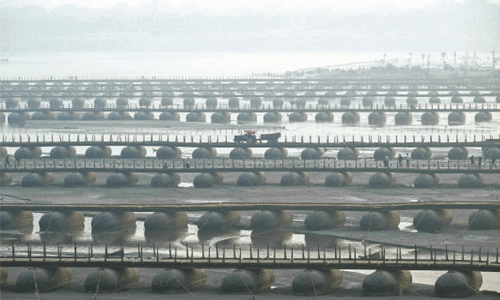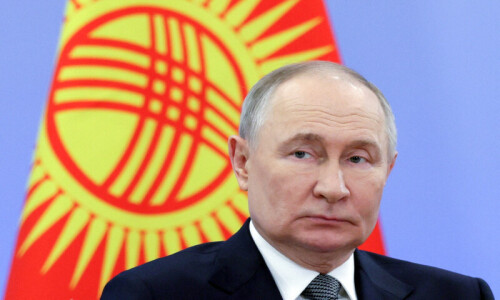ISLAMABAD, Nov 19: President Gen Pervez Musharraf has said that Pakistan is not encouraged by the signals coming from India over its efforts to solve the half-a-century-old dispute over Kashmir.
"The vibes that are now coming do not encourage a process of normalization," President Musharraf said in an interview with AFP late Thursday during which he also vowed to save Pakistan from the clutches of religious extremism.
Speaking for 40 minutes at his Army House residence, President Musharraf expressed disappointment that his offers to wind back Pakistan's long-held demands on the disputed territory were unmatched by any flexibility from India.
The president's reaction came after Indian Prime Minister Manmohan Singh ruled out considering new options floated by him for debate. They included carving up Kashmir into seven regions, demilitarizing them, and placing them under either joint control, United Nations mandate or full independence.
"We met in New York (in September) and I think our interaction was very good, very fruitful and it raised a lot of hopes. "But the vibes that we are getting now I would say are not very encouraging. "Certainly the vibes should be much better than this, that we are moving, that we want to...there ought to be a desire to move forward towards peace.
"While (from) there we get vibes in the opposite direction, they do not encourage peace." President Musharraf said violence in the occupied region would only stop when peace dialogue moved forward.
"Certainly whoever is doing the violence, the freedom struggle, the people who are fighting for freedom, will get encouraged and it will automatically reduce." The president also rejected the Indian allegation that Islamabad backed militants to fight Indian occupation forces. "Nothing is going from Pakistan. Everything is indigenous, it's happening inside Kashmir," he said.
President Musharraf gave a lukewarm welcome to the pullout of Indian occupation troops from Kashmir, suggesting it was a superficial step. "These are good optics, but they are not striking at the strategic issue of moving forward on a resolution.
"If out of 600,000 or 700,000 troops, 40,000 troops are removed, well we welcome it, it's a step forward, but however it is a tactical step forward." The president also stressed that Pakistan would not drop its lifelong demand for a plebiscite among Kashmiris unless India showed flexibility on its own long-held positions, such as not changing the de-facto border or Line of Control.
"We will be flexible, never unilateral. Pakistan will never leave its stand (on plebiscite), alone," he said. "Why leave the plebiscite when the vibe on the other side is they don't want to move an inch beyond their stated position, that 'we are not moving an inch'? So we stand by our stated position...the plebiscite.
"We will only leave it if India is prepared to show flexibility.... At the moment, no sir, we don't see that." "I'm saying that there's light at the end of the tunnel. Should we put that light off?"
Regarding Prime Minister Shaukat Aziz's meeting with Mr Singh on Tuesday in New Delhi to discuss peace measures and Kashmir, President Musharraf said it was too premature to formally present the options he outlined for public debate.
"Kashmir obviously will feature very importantly (in the talks), because we seek clarification on what is this happening? I proposed something else. I'm saying that there's light at the end of the tunnel. Should we put that light off?"
"I think both sides should make up their minds on what is the way forward and they need to discuss that first." He said that working out which parts of Kashmir should be carved up was a priority, before deciding on their status. "The more important issue is to decide on the block, or the segments or the regions, first of all which ought to be demilitarized and then status changed," he said.
UNIFORM ISSUE: The president said his reasons for resisting calls to give up his army post to become a civilian were tied in with the peace process with India, plus Pakistan's front-line role in the war on terror and his campaign to eradicate religious extremism.
"We have set the country on a certain course...our diplomatic relations, our foreign policy, we have set it on a certain course of fighting terrorism in the region. We want that to be sustained," he said.
"We have set a course towards bringing a societal reformation in Pakistan, where I believe that the extremists are holding sway. We want to make sure that they are suppressed, and the vast majority of moderates are brought up.
"Now there's a transformation, a renaissance...that we are going through. We want that process to be sustained and that is what is creating the doubts in my mind." The president conceded that he had promised on national television last December to shed his uniform.
But the current environment required otherwise, he said as he expounded on his belief that it was his destiny to save Pakistan from extremism. "I believe that there is something like destiny. I would like to take this country forward, get rid of all this extremism which is sapping us, sapping our real potential.
"I think it is (my destiny), because I am in this position.... So I think: I am here and I need to perform and I need to deliver for this nation."
PALESTINIAN DISPUTE: The president said solving the Palestinian dispute must be the top priority of US President George Bush in his second term if terrorism was to be defeated.
"Wherever there's a political dispute, they form the breeding grounds for militancy and extremism," he remarked. "Therefore you must fight at the root, and that is the resolution of the political disputes, and the root of the root is the Palestinian dispute.
"We look forward in his second tenure to his closing fronts, starting with the Palestine dispute, because that is the core of the core." "I expect President Bush and the US to play a much more proactive role and a just role to resolve disputes, political disputes."
President Bush must also conceive an exit strategy for Iraq, he added. "He must work out an exit strategy, for both Iraq and Afghanistan. Having said that, it's easier said than done," the president said.
"He must bring stability, he must ensure the territorial integrity of both Iraq and Afghanistan. They must bring stability there before they leave." The president said he believed elections should go ahead in Iraq in January as slated, except in areas gripped by violence. "I think the way forward is to hold elections. Whatever the difficulties we must try to surmount them."















































Dear visitor, the comments section is undergoing an overhaul and will return soon.